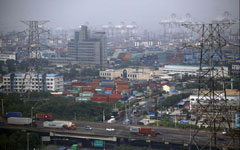Shanghai FTZ blazes national reform trail
Updated: 2014-06-06 10:54
(Xinhua)
|
|||||||||||
There is real concern that liberalization of existing controls may increase exposure to imported risks, and effective mechanisms are needed to hold them at bay.
The People's Bank of China, China's central bank, has asked banks to set up separate accounting units to handle cross-border capital transactions in the zone. Yuan transfers from these accounts to domestic ones is limited to current account transactions, loan repayments and non-financial investment.
 |
 |
"It all comes down to one simple thing: no business activity in the zone should serve speculative ends," she said. Though there are still limits in many cross-border transactions, there is enough wriggle room for day-to-day operations. "We understand these limits are there mostly to weed out arbitrage," Zhang added.
Acknowledging the achievements of the Shanghai FTZ, Zhu Xiaoming, executive president of China Europe International Business School (CEIBS), said both financial and non-financial institutions surveyed by the school are still confused. Although facilitating cross-border capital flow has aroused interest in innovation, companies in the zone are still concerned about crossing regulatory redlines.
He urged regulators to address what he called the "information asymmetry" between policy makers and market participants in the zone. One suggestion he offered is to introduce a third-party institution to run orientation programs for companies.
Jian Danian, deputy director of the Shanghai FTZ's administrative committee, said during a forum held by CEIBS last month that the FTZ is not just another development zone with preferential treatment.
"(The FTZ) is where we test bold reform initiatives. If it works at the FTZ, we consider expanding it nationwide. If something doesn't work there, then we drop it. This is what happens in the FTZ," Jian said.
Related Stories
Offshore gold contracts to be traded in FTZ 2014-06-05 06:51
Shanghai FTZ ready to spread its model nationwide 2014-05-27 07:12
PBOC announces rules for accounts in Shanghai's FTZ 2014-05-23 07:02
Cross-border capital flow eased in Shanghai FTZ 2014-05-17 13:00
Shanghai FTZ mulls cutting negative list 2014-05-15 16:11
Shanghai's first private bank to land in FTZ 2014-05-15 14:14
Today's Top News
Vets flock to Normandy to remember D-Day
G7 'deeply concerned' about S China Sea tensions
Ukraine tightens control on border
Silk Road offers Sino-Arab blueprint
Clinton 'loves to see' female leader
US says to work with Egypt's president-elect
Oversight of military firms on rise in China
Abbott aiming to mend ties with Jakarta
Hot Topics
Lunar probe , China growth forecasts, Emission rules get tougher, China seen through 'colored lens', International board,
Editor's Picks

|

|

|

|

|

|





